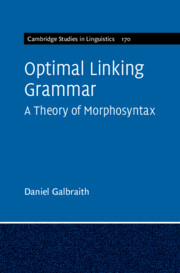5 - Competing Grammars
Published online by Cambridge University Press: 20 April 2023
Summary
In Chapter 5, the competing grammars model of morphosyntactic variation is introduced from both a sociolinguistic and computational perspective. The example of nominative substitution in Faroese is used to demonstrate the advantages of the model, in particular the combination of classic Optimality Theory constraints with a probabilistic activation hypothesis. The Faroese dative-subject verbs discussed in Chapters 2 and 4 occur in both dative–accusative and nominative–accusative case frames. The competing grammars model is outlined as a cogent explanation of the co-existence of both forms in use by a given speaker, sometimes within the same text or short series of utterances. Relevant factors proposed to influence selection of the nominative versus dative variants are discussed, including both grammatical and social/contextual variables. The importance of social meaning in determining case selection is highlighted, which presents a Rational Speech Act model of this morphosyntactic variable. In a section co-authored with Rob Mina, the issue of bimodally distributed judgement data is explored, in particular whether such data are effectively random or represent distinguishable dialects, and how to tell. Finally, neural approaches are discussed as an alternative model of competing grammars.
Keywords
Information
- Type
- Chapter
- Information
- Optimal Linking GrammarA Theory of Morphosyntax, pp. 105 - 137Publisher: Cambridge University PressPrint publication year: 2023
